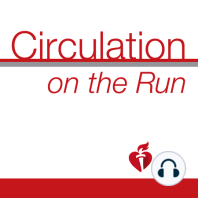16 min listen
Circulation December 4, 2018 Issue
ratings:
Length:
25 minutes
Released:
Dec 3, 2018
Format:
Podcast episode
Description
Dr Carolyn Lam: Welcome to Circulation on the Run, your weekly podcast summary and backstage pass to the journal and its editors. I'm Dr Carolyn Lam, Associate Editor from the National Heart Center and Duke National University of Singapore. Our featured paper this week reports the five-year clinical outcomes and valve durability in the largest available cohort to date of consecutive high-risk patients undergoing transcatheter aortic valve replacement. You must listen up for this discussion, coming right up after these summaries. The first original paper describes a personalized risk assessment platform that promotes the implementation of precision medicine by helping us with the evaluation of a genomic variant of uncertain significance. A genomic variant of uncertain significance is a rare or novel variant for which disease pathogenicity has not been conclusively demonstrated or excluded and thus cannot be definitively annotated. These variants therefore pose critical challenges to the clinical interpretation and risk assessment. New methods are therefore urgently needed to better characterize their pathogenicity. Co-first authors, Dr Ma, Zhang, and Itzhaki, corresponding author Dr Wu from Stanford University School of Medicine and colleagues recruited a healthy, asymptomatic individual lacking cardiac disease clinical history and carrying hypertrophic cardiomyopathy associated genetic variant in the sarcomeric gene, MYL3, which has been reported by ClinVar database to be likely pathogenic. Human-induced pluripotent stem cells or IPSCs were derived from the heterozygous carrier, and their genome was edited using CRISPR/Cas9 genome editing to generate karyo-specific IPSCs. Extensive essays, including measurements of gene expression, sarcomere structure, cell size, contractility, action potentials, and calcium handling were performed on the isogenic IPSC-derived cardiomyocytes, and together, the platform was shown to elucidate both benign and pathogenic hypertrophic cardiomyopathy-functional phenotypes. Thus, this paper demonstrates for the first time the unique potential of combining IPSC-based disease modeling and CRISPR/Cas9 genome editing technology as a personalized risk assessment platform for determining the pathogenicity of a variant of unknown significance for hypertrophic cardiomyopathy in a patient-specific manner. Transcatheter aortic valve replacement is increasingly being used for the treatment of severe aortic valve stenosis in patients at intermediate risk for surgical aortic valve replacement. The next paper provides real world data comparing indications and clinical outcomes of patients at intermediate surgical risk undergoing isolated transcatheter vs. surgical aortic valve replacement. Co-first and corresponding others, Dr Werner and Zahn from Clinical Ludwigshafen in Germany compared clinical characteristics and outcomes of more than 7,600 patients with intermediate surgical risk who underwent isolated transcatheter or conventional surgical aortic valve replacement within the prospective all-comers, German aortic valve registry between 2012 and 2014. Multi-variable analyses reveal that factors that were associated with performing transcatheter instead of surgical aortic valve replacement included advanced age, coronary artery disease, New York Heart Association class three or four, pulmonary hypertension, prior cardiac decompensation, and elective procedure, arterial occlusive disease, no diabetes mellitus, and a smaller aortic valve area. Unadjusted in-hospita
Released:
Dec 3, 2018
Format:
Podcast episode
Titles in the series (100)
Circulation June 6, 2017 Issue: Circulation Weekly: Your Weekly Summary & Backstage Pass To The Journal by Circulation on the Run
